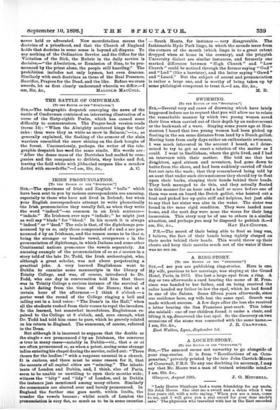IRISH PRONUNCIATION.
[To THE EDITOR OF THE "SPECTATOR."] SIR,—The specimens of Irish and English " bulls " which have been sent to you by various correspondents are amusing, 'especially to those who have not lived in Ireland; but when your English correspondents attempt to write phonetically the Irish pronunciation they usually fail, as when they write the word "indeed"—so common in an Irish sentence- ." indade." No Irishmen ever says " indade ; " he might just as well say " blade " for "bleed." In his mouth it is always 4' indeed" or "'deed." The rule is that, of the diphthongs pro- nounced by us ee, only those compounded of e and a are pro- nounced a by an Irishman, and the reason seems to be that a, being the stronger or broader vowel, overpowers e in the pronunciation of diphthongs, in which Italians and some other Continental nations pronounce the vowels separately. An amusing example of the pronunciation of ea as a occurs in a -story told of the late Dr. Todd, the Irish archmologist, who, although a great scholar, was not above perpetrating a practical joke. A very learned Englishman went to Dublin to examine some manuscripts in the library of Trinity College, and was, of course, introduced to Dr. Todd, who one day in conversation told him that there was in Trinity College a curious instance of the survival of a habit dating from the time of the Danes; that at a :tertain hour of the afternoon — I think 6 o'clock — a porter went the round of the College ringing a bell and aalling out in a loud voice : "The Dane's in the Hall," when all the students rushed from their rooms to repel the invaders. So the learned, but somewhat incredulous, Englishman re- paired to the College at 6 o'clock, and, sure enough, what Or. Todd had told him came to pass, which he gravely related an his return to England. The summons, of course, referred to the Dean.
But although it is incorrect to suppose that the double or the single e are pronounced a by an Irishman, the converse 48 true in many cases—notably in Dublin—viz., that a or ai, are often pronounced ee, as when a priest, seeing some strange ladies entering his chapel during the service, called out: "Three aheers for the leedies !" with a response unusual in a church. ft is curious, and there must be some reason for it, that the accents of all capital cities are "mincing." The inhabi- tants of London and Dublin, and, I think, also of Paris, seem to be unable or unwilling to open their months wide ; witness the " biby" and " lidy " of London, and in Dublin the instance jast mentioned among many others. Similarly the consonants are slurred over and barely pronounced. In England the farther one goes north, within limits, the broader the vowels become ; whilst south of London the pronunciation is very flat, so much as to be in some counties — South Hants, for instance — very disagreeable. The fashionable Hyde Park lingo, in which the sounds issue from the corners of the month (which lingo is to a great extent dropped when at home in the country), and the priggish University dialect are similar instances, and formerly one marked difference between "High Church" and "Low Church" could be noticed through the former saying " Gud" and "Lud" (like a barrister), and the latter saying " Gawd " and " Loard." But the subject of accent and pronunciation is rather a large one, and is worthy of being taken up by some philologist competent to treat it.—I am, Sir, &o,
IL B.


































 Previous page
Previous page